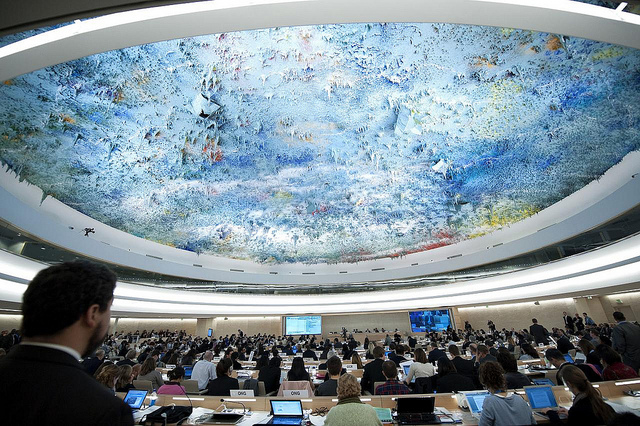
Credit: UN Photo/Jean-Marc Ferré
As advocates prepare to attend the United Nations Human Rights Council’s 24th Session, to be held in Geneva from September 9 to 27, two of the Council’s subsidiary bodies will be in session this month. The Advisory Committee will convene to make advances in the study of topics of interest identified by the Council, and the Working Group on Communications will evaluate alleged human rights abuses submitted to the Council’s Complaint Procedure.
Advisory Committee’s 11th Session
The Advisory Committee, a human rights think-tank composed of 18 independent experts of various professional backgrounds representing different geographic regions, is currently meeting in Geneva from August 12 to 16. The Advisory Committee provides the Council with research-based advice on thematic human rights issues at the Council’s behest.
The Advisory Committee’s Eleventh Session opened yesterday with a minute of silence for the victims of human rights violations around the world. [OHCHR] During this session, the Committee will discuss the Council’s pending research requests regarding the enhancement of international cooperation, the effect of corruption on human rights, and the state of human rights in post-disaster or post-conflict situations, in addition to discussing potential research proposals to be submitted to the Council. [OHCHR] See the Advisory Committee’s draft program of work for its August session here.
The Advisory Committee’s research often provides key evidence the Council considers when adopting resolutions to address human rights problems. For instance, the Council previously requested the Advisory Committee to prepare a report on the impact of terrorist hostage-taking on human rights and the role regional or international cooperation in those situations. The resulting study’s conclusion included the finding that large ransoms lead to a vicious cycle that increases the number of kidnappings. See Human rights and issues related to hostage-taking, A/HRC/AC/10/2, para 33. Part of the problem, the draft study suggests, is that the existing International Convention against the Taking of Hostages does not regulate ransom payments. Id. at para. 63. The report recommended strengthening legislation at a domestic level to address this loophole, and increasing regional and international cooperation on these issues. The Committee will submit the final study for the Council’s consideration during its twenty-fourth session, in September. [OHCHR]
The Advisory Committee may also study human rights issues on its own initiative. Although it lacks the authority to independently adopt resolutions or decisions regarding human rights issues, the Committee may submit to the Council research proposals it believes warrant consideration. Past proposals have included research regarding the right to food, and the rights of peasants. Based on the Advisory Committee’s research and draft declaration, the UN Human Rights Council last year approved Resolution 21/19, establishing an open-ended Working Group to prepare and submit a draft declaration articulating the rights of peasants, a novel international instrument. [IJRC]
Working Group on Communications’ 13th Session
At its September session, the Human Rights Council will hold closed meetings to assess alleged situations of gross human rights violations brought to its attention through its complaint procedure, a forum for individuals, groups, or non-governmental organizations alleging violations of human rights. The Council’s assessments will be facilitated by the Working Group on Communications and Working Group on Situations, which examine written communications and report patterns of gross and reliably attested human rights violations to the Council, respectively.
The Working Group on Communications is a five-member body of independent experts that meets twice annually to assess the admissibility and merits of each communication received through the complaint procedure. It also identifies whether the communication – individually or together with other communications – “appears to reveal a consistent pattern of gross and reliably attested violations of human rights and fundamental freedoms.” [OHCHR] At its thirteenth session from August 19 to August 23 in Geneva, the Working Group on Communications will examine communications received between October 2012 and March 2013. [OHCHR]
All communications found admissible are forwarded to the State concerned for its observations, and may be referred to the Working Group on Situations, which is authorized to make recommendations to the Council for a course of action. [OHCHR] The Working Group on Situations recently held its twelfth session from June 24 to 28, 2013.
For its part, the Human Rights Council will decide to: 1) reject further consideration of a communication,2) “Keep the situation under review and request the State concerned to provide further information within a reasonable period of time”; 3) “Keep the situation under review and appoint an independent and highly qualified expert to monitor the situation and report back to the Council;” or 4) “Discontinue reviewing the matter under the confidential complaint procedure in order to take up public consideration of the same.” [OHCHR] The Council is scheduled to review complaints on September 25, as part of its upcoming session.
Human Rights Council’s 24th Session
The Human Rights Council is the United Nations’ core institution for “promoting universal respect for the protection of all human rights and fundamental freedoms for all, without distinction of any kind and in a fair and equal manner human rights,” as well as working towards the prevention of human rights violations and responding to human rights emergencies throughout the globe. General Assembly Resolution, A/RES/60/251 (3 April 2006), para. 2
The scope of issues to be discussed during the September session is broad, paralleling the Council’s expansive mandate; items on the agenda range from gender integration, the effect on human rights of children whose parents face the death penalty, to children during armed conflict. Some of the reports to be considered include those of the special procedure mandate holders on: hazardous substances and wastes the occupied Palestinian territories, and contemporary forms of slavery. Links to the Council’s provisional agenda, reports to be considered, and calendar for thematic resolutions can be found here.
Information on civil society advocacy before the Human Rights Council can be found on the International Justice Resource Center’s website here.
